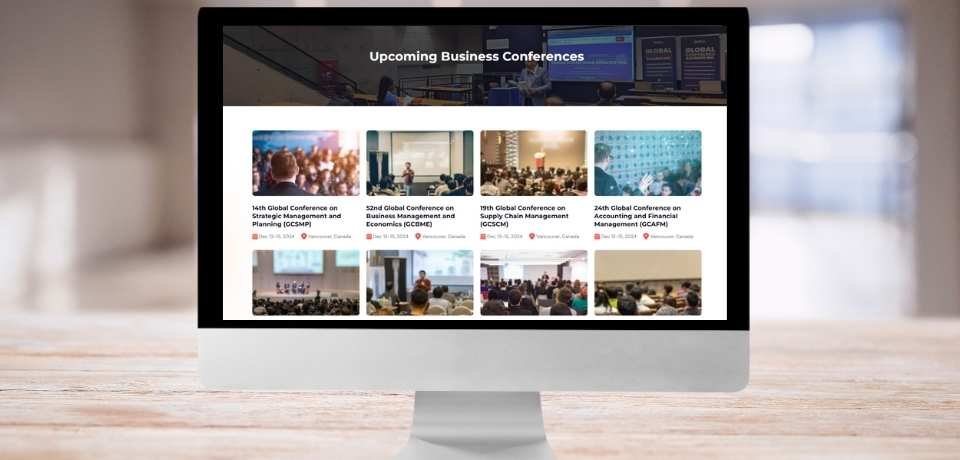A business conference is an organized event where professionals come together to share knowledge, network, and discuss industry trends. These events typically feature speakers, workshops, and panel discussions aimed at enhancing participants’ knowledge of their fields. This might make you ask: How to choose the right business conference?
Selecting the right business conference involves several key factors. Start by identifying your professional goals, such as networking or skill development. Research the conference’s agenda to ensure it aligns with your interests and industry trends. Additionally, consider the quality of speakers and the potential networking opportunities available to maximize your experience.
Would you like to know how to make the right career choice? Keep reading to discover essential tips and insights that will help you select the perfect business conference according to your needs!
Why is It Important to Choose the Right Business Conference?
Your professional growth and networking opportunities can be maximized by attending the right business conference. Attending a conference that aligns with your career goals allows you to gain insights from industry leaders and learn about the latest trends. This focus ensures that the time and resources invested yield valuable returns.

Moreover, the right conference can significantly improve your networking experience. Meeting like-minded professionals who share your interests can lead to potential collaborations and partnerships. By connecting with others in your field, you create opportunities for future projects and broaden your professional circle.
For example, in Canada, numerous industry-specific events can offer valuable insights. Attending the upcoming Canadian business conferences ensures you stay updated on relevant opportunities that could boost your career. These conferences often attract top experts, providing the perfect platform for learning and growth.
What to Consider When Choosing a Business Conference?
The right business conference can make a significant difference in your professional development. With various options available, you should consider different aspects to ensure you select an event that aligns with your goals and offers valuable experiences. Below are key factors to consider.
Objectives and Goals
Before selecting a conference, clarify your objectives. Are you looking to learn new skills, network with industry leaders, or explore innovative ideas? Defining your goals helps narrow down your options. Consider how each conference aligns with these objectives. When your goals are clear, you can choose an event that promises to meet your specific needs, enhancing your overall experience.
Location and Accessibility
The location of the conference plays a vital role in your decision-making process. If it’s a local event, commuting will be easier, saving you time and money. However, if you’re considering a destination conference, assess accessibility and travel logistics. A well-placed venue that is easy to reach can enhance your experience and make attending more enjoyable. Also, consider accommodation options and transportation methods to ensure a smooth trip.
Agenda and Content
Review the agenda and topics that will be covered during the conference. A well-structured program should feature sessions that align with your interests and industry trends. Look for workshops, keynote speeches, and panels that offer valuable insights and practical knowledge. The quality and relevance of the content can make a significant difference in what you gain from the event. Ensure the topics are timely and applicable to your work for the best results.
Networking Opportunities
A business conference is incomplete without networking. Look for events that facilitate connections among attendees. Opportunities like breakout sessions, social gatherings, and informal meet-ups can lead to meaningful conversations and potential collaborations. The ability to interact with industry peers and leaders can improve your professional network and create lasting relationships that benefit your career.
Cost and Value
Consider the value of the conference about the cost of attending. Consider registration fees, travel expenses, and accommodation costs. However, focus not just on the price tag but also on the potential benefits. If the conference offers high-quality content, renowned speakers, and valuable networking, it may be worth the investment. Determine if the return on investment justifies the overall expenditure.
Choosing the right business conference involves careful consideration of your goals, the event’s location, agenda, networking potential, and overall value. By considering these factors, you can make an informed decision that enhances your professional journey.
How to Choose the Right Business Conference?
To maximize your professional development, you should choose the right business conference. With so many options available, it can feel confusing. By focusing on specific criteria, you can simplify the process and find the best event to attend.

Industry Relevance
Consider the relevance of the conference to your industry. Events that cater specifically to your sector often provide the most valuable insights and networking opportunities. Look for conferences that focus on trends, challenges, and innovations within your field. This ensures that the information you gain will apply to your work and can contribute to your career growth.
Conference Size
The size of a conference can significantly impact your experience. Larger conferences may offer a wider variety of sessions and networking opportunities, but they can also feel impersonal. On the other hand, smaller conferences may facilitate more intimate interactions and deeper discussions. Think about what type of environment will best suit your needs when choosing a conference.
Session Formats
Analyze the different formats of sessions offered at the conference. These may include workshops, panel discussions, keynote speeches, and networking events. Each format serves a different purpose and can adapt to various learning styles. Selecting a conference that provides a mix of session types will maximize your overall experience and keep you engaged throughout the event.
Speaker Credentials
Research the credentials of the speakers presenting at the conference. Renowned industry leaders and experts often draw large audiences and provide high-quality content. When choosing a conference, look for events that feature speakers with a proven track record in your field. Their insights can lead to significant takeaways that you can apply in your professional life.
Past Attendee Feedback
Gather feedback from past attendees to understand their experiences. Reviews can provide valuable insights into the conference’s quality, content, and overall value. This information can help you make an informed decision when selecting the right business conference. Look for testimonials that mention specific benefits or areas for improvement, giving you a clearer picture of what to expect.
Timing and Schedule
Depending on the time of the conference, you may be unable to attend. Consider your personal and professional commitments when considering potential events. Ensure that the conference dates fit well within your schedule. Additionally, review the daily agenda to see if it allows for adequate breaks and networking time. A well-structured schedule can improve your overall experience.
Follow-Up Opportunities
After the conference, consider how you will maintain the connections and knowledge gained during the event. Look for conferences that offer follow-up opportunities, such as access to recorded sessions or online communities. These resources can help reinforce what you’ve learned and keep you connected with fellow attendees. Choosing a conference also means considering the long-term value it can provide beyond the event itself.
The right business conference is determined by several factors, including industry relevance, size, format, speaker credentials, past attendee feedback, timing, and follow-up opportunities. By considering these aspects, you can make a well-informed choice that aligns with your professional goals.
Essential Documents to Attend a Business Conference
It takes preparation and organization to attend a business conference. Having the right documents on hand can make your experience smooth and productive. Being well-prepared allows you to focus on networking and learning rather than worrying about missing materials.
- Registration Confirmation: This document serves as proof of your registration and often contains important details such as the conference agenda, venue, and any special instructions for attendees.
- Travel Schedule: A detailed schedule includes your travel plans, flight information, and hotel reservations. Keeping this organized helps ensure you arrive on time and have accommodations ready upon your arrival.
- Business Cards: Having a sufficient supply of business cards is essential for networking. They provide a convenient way to share your contact information and leave a lasting impression with new connections.
- Notebook and Pen: Bringing a notebook or digital device allows you to take notes during sessions and workshops. Recording key insights and ideas helps remember what you learn at the conference.
- Copy of Your Resume: Having an updated resume on hand can be beneficial for unexpected networking opportunities. It allows you to showcase your experience and skills to potential employers or collaborators.
- Presentation Materials: If you are presenting at the conference, ensure you have all the necessary materials, including slides and handouts. Being prepared with these documents will help you deliver a professional presentation.
Being prepared with essential documents can greatly improve your experience at a business conference. Having everything organized allows you to concentrate on networking, learning, and making the most of the opportunities available to you.
Tips for Measuring the Relevance of a Business Conference
A business conference’s relevance to your professional goals and needs must be measured. Analyzing the potential value of a conference can help you decide if it’s worth your time and investment. Here are some tips for determining relevance.

Assess the Expertise of the Attendees
When analyzing a conference, consider the types of professionals attending. Elite attendees often indicate a valuable networking experience. If the majority of the audience includes key decision-makers, innovators, or thought leaders, the conference is likely to offer valuable opportunities for meaningful connections and learning.
Review the Depth of the Conference Sessions
The depth of the conference sessions is important in determining its relevance. Sessions that offer in-depth discussions on advanced topics, rather than basic overviews, will likely provide more value. Assess the complexity of the topics to ensure they match your level of expertise and interest.
Check for Industry-Specific Trends
A relevant conference should address current trends within your industry. Investigate whether the event includes sessions or discussions on emerging technologies, challenges, or market shifts. By staying updated on these trends, you ensure that you gain timely knowledge that can be applied in your work.
Consider the Level of Engagement
Organizers can offer attendees multiple opportunities to engage at a well-structured conference. Look for events that encourage active participation through workshops, hands-on sessions, and interactive discussions. The more engaged you are, the more relevant and impactful the experience will be for your professional growth.
Explore the Geographical Relevance
When deciding if a conference is relevant, consider whether the location offers additional benefits. You can select top places to attend business conferences which will provide access to industry hubs or regional insights. Conferences in major business cities often attract more influential attendees and cover topics relevant to the specific economic geography.
Measuring the relevance of a business conference requires looking at the expertise of the attendees, session depth, industry trends, engagement levels, and even the location. Considering these factors will help ensure you choose a conference that brings significant value to your professional journey.
Frequently Asked Questions
Choosing the right business conference can feel overwhelming with so many options available. To make the process easier, we’ve compiled answers to common questions that professionals often have when deciding which event to attend. These FAQs will guide you toward selecting the best conference for your goals.
What Is the Ideal Size for a Business Conference?
The ideal size depends on your preferences and goals. Large conferences offer a wide variety of sessions and extensive networking, while smaller events provide more intimate interactions. Consider whether you prefer a broader range of topics or deeper, more personal connections when choosing between large or small conferences.
Should I Prioritize Virtual or In-Person Conferences?
Both options have their benefits. In-person conferences offer face-to-face networking and hands-on experiences, while virtual events provide convenience and flexibility. Analyze your personal needs and schedule to determine which format best suits your goals and availability.
How Do I Find Conferences That Fit My Budget?
Look for early-bird discounts, scholarships, or employer sponsorships to help reduce costs. Compare conference fees with potential value, including speakers, sessions, and networking opportunities. Budgeting for conferences involves assessing the return on investment and weighing the value against the price.
What Should I Expect From Conference Workshops?
Workshops offer hands-on learning and practical knowledge. They often focus on specific skills or challenges within your industry. By attending workshops, you can deepen your knowledge of key topics, interact with experts, and immediately apply what you’ve learned to your work.
How Can I Maximize Networking at a Conference?
Come prepared with business cards and an elevator pitch to introduce yourself. Attend networking events, such as meet-ups or breakout sessions, to engage with peers. Focus on building meaningful connections by actively listening and following up after the conference to maintain relationships.
Conclusion
Selecting the right business conference can greatly impact your professional development and networking opportunities. By focusing on specific criteria, such as your objectives, the event’s relevance, and potential networking benefits, you can effectively determine how to choose the right business conference. This thoughtful approach ensures you attend events that align with your career goals.
To maximize your conference experience, always research the agenda, check speaker credentials, and connect with fellow attendees. Remember to set clear objectives and stay engaged during the sessions. Best wishes as you proceed on your search to find the ideal conference that enhances your professional growth!